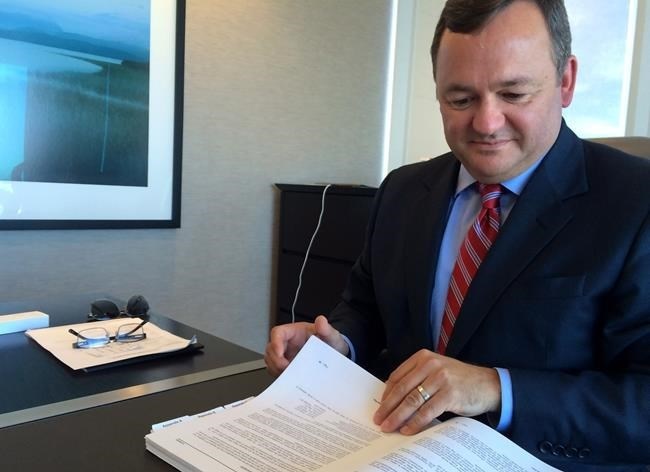
Fortis President and CEO Barry Perry is pictured at Fortis Inc.'s headquarters, in St. John's, N.L., on Thursday, October 13, 2016.
Image Credit: THE CANADIAN PRESS/Sue Bailey
October 16, 2016 - 11:30 AM
ST. JOHN'S, N.L. - The head of Fortis Inc. laughed when asked who will get to press the button Tuesday morning when the Newfoundland-based company rings the opening bell at the New York Stock Exchange.
"I'm a team player — mostly," said CEO and President Barry Perry, whose 11th-floor office overlooks a spectacular sweep of colourful clapboard houses, the St. John's harbour and iconic Signal Hill.
"But this time around, I'm going to be that guy. My former boss at times used to say: 'Rank does have some privileges.'"
That former boss is his mentor and predecessor at Fortis, Stan Marshall, another Newfoundlander who was deeply proud of the North American corporate giant's roots and steadfast presence in the province.
Perry took over the top job after Marshall retired in 2014. With the closing Friday of its US$11.3-billion deal to acquire Novi, Mich.-based ITC Holdings Corp., he now leads one of North America's top 15 regulated, investor-owned utilities.
Its 8,000 employees run electric and gas utilities in five Canadian provinces, nine U.S. states and three Caribbean countries.
Common shares of Fortis started trading Friday on the New York Stock Exchange under the ticker symbol FTS — the same used for previous and continued trading on the Toronto Stock Exchange.
It's just the second company with Newfoundland roots, after CHC Helicopter Corp., to list on the NYSE. Tuesday's ringing of the opening bell is more the symbolic marking of a coveted milestone for a company with assets now worth more than C$45 billion.
Fortis could be headquartered in a skyscraper overlooking New York City. The company that traces its evolution to the St. John's Electric Light Company founded in 1885 now has about 60 per cent of its interests in the U.S.
But despite the hours of extra air travel and other logistics, Perry said there are no plans to leave St. John's.
"I have no intention of moving Fortis out of Newfoundland."
If anything, he believes the company should play a greater role in the province through its utility Newfoundland Power.
"There's going to be a need for investment in transmission, investment in backup generation," Perry said. "We'd like to be considered to be a part of that."
He said he often thinks of Marshall, who came out of retirement last spring to become head of Crown corporation Nalcor Energy and chief fixer of the troubled Muskrat Falls hydro project in Labrador.
With costs including financing now estimated at $11.4 billion — up from $7.4 billion four years ago — Marshall has agreed it's so far a "boondoggle" that he'll try to sort out before first power flows in 2019. He has described it as an oversized venture that relied on perpetually high oil prices which have since crashed.
Perry believes Muskrat Falls illustrates a failure to balance the accelerating shift toward renewable, cleaner energy sources with affordability.
"The impact on power rates is going to be very dramatic," he said. "We always have to be aware that customers pay the bills."
As for the future, Perry said he believes Fortis will have more acquisition opportunities in the U.S. when the time is right.
Glenn Rowe, associate professor of strategic management with the Ivey Business School at Western University, said Fortis has done particularly well by shareholders for a regulated entity.
The company's website says it has increased dividend payments to common shareholders in each of the last 42 years, "longer than any other Canadian public corporation."
Rowe said Fortis also subscribes to a wise business acquisition model.
"Their goal is to let each business have autonomy in running itself and not to interfere with that unless, of course, there are major issues."
As for the ringing of the opening bell at the New York Stock Exchange: "It's kind of cool that a company headquartered in Newfoundland gets to do that," Rowe said.
For Perry, a self-described "bayman" from the fishing town of New-Wes-Valley on Bonavista Bay, there's nowhere else he'd rather be.
"It's a pretty amazing story," he said of Fortis and how it expanded under Marshall's guidance far beyond provincial borders. "There has to be some connection to our success about being here.
"I think, fundamentally, it's the culture of Newfoundland. It's the strength of our character, integrity, all these things."
News from © The Canadian Press, 2016